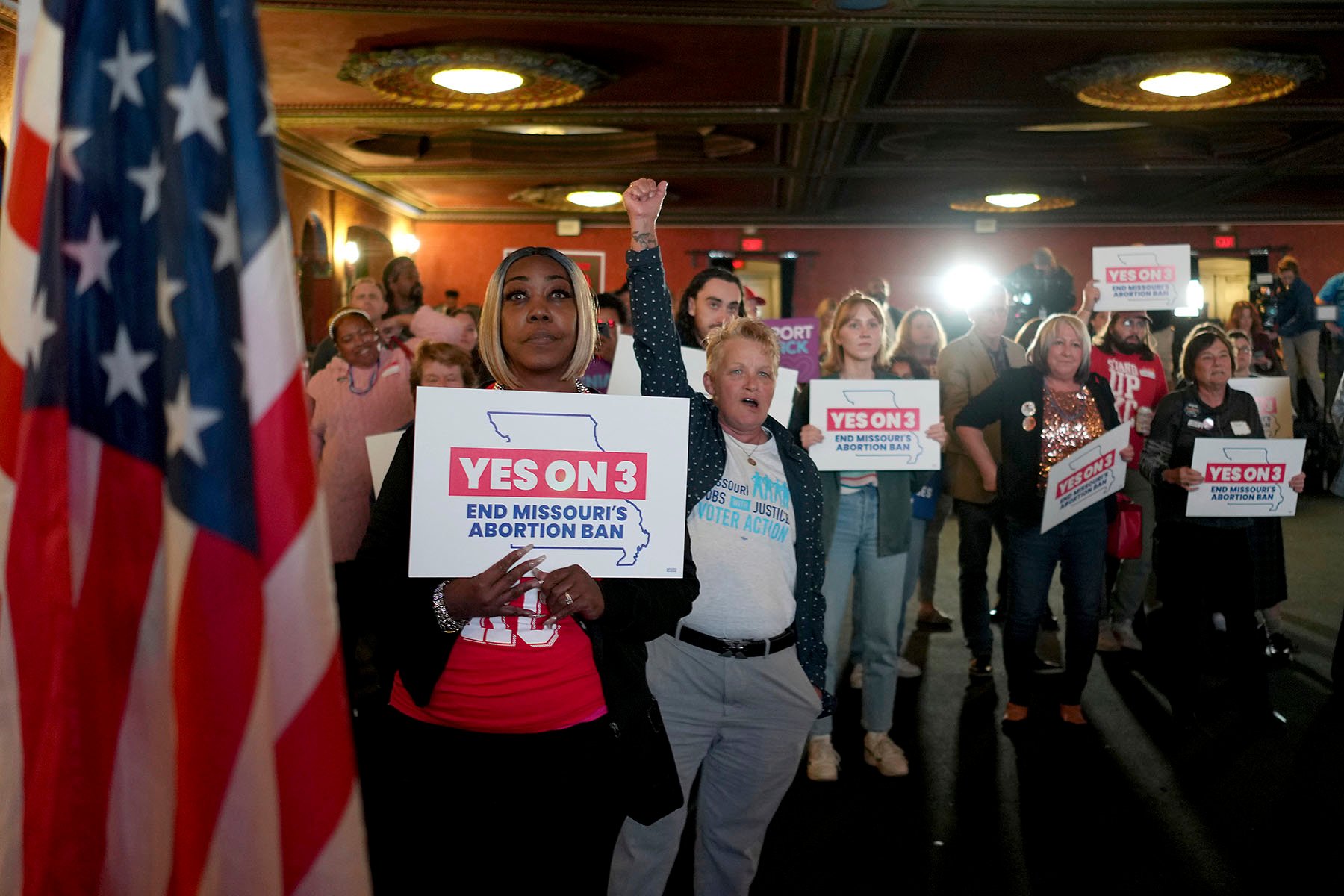Donald Trump’s presidential victory — declared early Wednesday morning — will make abortion rights more vulnerable, even as seven states across the country voted to protect access to the procedure on Election Day.
Trump has taken credit for the fall of Roe v. Wade in June 2022, and has strong ties to the anti-abortion community. A collection of his former advisers, writing in the conservative policy blueprint Project 2025, have argued a second Trump administration should limit access to abortion nationally — using federal powers without relying on Congress — even though Trump on the campaign trail declined to take a clear stance on the issue.
Since his victory, abortion opponents have begun to clamor for executive action that could move the country toward a national abortion ban.
“President Trump’s first-term pro-life accomplishments are the baseline for his second term,” said Marjorie Dannenfelser, president of SBA Pro-Life America, an influential anti-abortion group. Dannenfelser went on to say that GOP efforts should be centered on the “unalienable right to life” that exists under the 14th amendment — an allusion to an anti-abortion argument that the U.S. Constitution grants equal protection to embryos. That theory could lead to banning abortion and in vitro fertilization.
“The stakes have never been higher for abortion access,” said Molly Duerte, an attorney with the Center for Reproductive Rights, who has worked on numerous lawsuits challenging state abortion bans.
-
Read Next:
Republicans are positioned to control the U.S. Senate, and the fate of the House of Representatives is yet to be determined, leaving uncertainty over whether abortion opponents could have the votes in Washington to push for new legislation banning the procedure.
Passing new legislation would be an uphill battle. Even if Republicans control the House of Representatives, they will likely have a slim margin — and they will not have a filibuster-proof majority in the Senate, meaning they would have to suspend the body’s ordinary rules to pass a law.
But new legislation may not be necessary. Former advisers to Trump have suggested the president-elect could leverage the Food and Drug Administration to revoke federal approval of mifepristone, the medication used to induce abortions — the most popular method to terminate a pregnancy. Some have also argued he could revive an 1800s anti-obscenity law known as the Comstock Act, which outlaws mailing anything “designed, adapted, or intended for producing abortion.”

Such an approach would be litigated in the courts, but if adopted, it could effectively ban abortion nationwide. In oral arguments over a separate abortion case this year, Supreme Court Justices Clarence Thomas and Samuel Alito expressed openness to the idea that the Comstock Act could ban abortion, and the theory has become popular in conservative legal circles.
“They might prefer to use Comstock first, because it would be much easier and would go more under the radar than passing a new federal law,” said Greer Donley, a professor at the University of PIttsburgh who studies abortion law.
Despite repeated questioning, Trump declined to answer on the campaign trail whether, if elected president once more, he would leverage the Comstock Act or other executive authority to limit access to abortion In his acceptance speech early Wednesday morning, he did not mention abortion.
Down-ballot races suggest a complex picture for abortion, due to mixed results for individual abortion rights measures, state legislative elections and state supreme court races.
Abortion opponents broke their losing streak at the ballot box — notching in particular a high-profile victory in Florida. There, a ballot measure that would have enshrined reproductive rights in the state constitution was defeated, which will overturn the state’s six-week ban. Though a majority of Floridians supported the amendment, it fell just shy of the state’s 60 percent threshold for ballot measure.
The measure’s failure leaves open the door for the Sunshine State to enact an even stricter ban, a move that would decimate access to abortion in the South. In the region, only North Carolina and Virginia allow abortion past six weeks of pregnancy, and North Carolina outlaws it after 12.
Abortion rights measures also failed in Nebraska, where the state currently bans abortion at 12 weeks, and in South Dakota, which has a near-total ban, according to The Associated Press. Nebraska voters endorsed a measure that enshrines its 12-week ban and leaves the door open to future restrictions.
Only two other states with abortion bans — Oklahoma and Arkansas — allow for ballot measures that could overturn those laws; this year, the Arkansas secretary of state refused to let a proposed abortion rights measure make it to the ballot, a decision upheld by the state supreme court. North Dakota also allows for abortion rights measures, though the procedure is legal in that state, the result of a state court ruling that struck down its ban.
In Ohio’s state Supreme Court races — which had become an abortion rights proxy battle — Republicans swept three open seats, cementing a 6-1 majority, despite significant campaigning by the ACLU. Though the state constitution protects abortion rights thanks to a 2023 ballot measure, the courts are tasked with interpreting how that measure affects abortion bans. In Texas, too, Republican state Supreme Court justices won their elections, despite widespread disapproval of the state anti-abortion policies they have upheld. Polling from the Public Religion Research Institute finds that only 11 percent of Texans support banning abortion entirely.
Abortion protections could grow stronger in some states after the election. That includes Colorado, where a successful abortion rights measure would eliminate the state’s ban on public dollars paying for the procedure, paving the way for state insurance plans to cover abortion.
Missouri and Arizona could move to eliminate their abortion bans, after voters amended their state constitution to protect abortion rights, according to Decision Desk HQ. They would be the first states to overturn an active abortion ban because of direct democracy. But implementing the new measures could take months, and will rely on judicial interpretation.
Abortion rights measures also passed in New York, Maryland and Montana, Decision Desk HQ projected, though notably, the procedure was already legal in all of them.
In other states, victories for abortion rights will maintain a restrictive status quo, but stave off new limits on the procedure. Campaigning in part on abortion rights, North Carolina Democrats narrowly broke Republicans’ supermajority in the state legislature — a development that, coupled with their resounding gubernatorial victory — ends Republicans’ chances of passing further restrictions. Amarillo, a conservative town in Texas, rejected an anti-abortion measure that would have made the state an anti-abortion “sanctuary” by creating civil liabilities for those who aid and abet people seeking to travel for abortions. The results don’t reverse the state’s near-total abortion ban.

Meanwhile, conservative gains in Texas could create an opening for new state-specific restrictions, paving the way for a new phase of anti-abortion activity.
In that state, where abortion has been almost completely outlawed since the June 2022 decision on Roe, abortion opponents have “a stronger legislature than we have in the last six years,” said John Seago, the head of Texas Right to Life, an anti-abortion group. This year, 15 Republican incumbents in the state legislature lost their primaries to more conservative challengers.
With some distance now from the fall of Roe, which engendered blowback across the country, Texas legislators appear more receptive to pushing for abortion restrictions even beyond the state’s ban, Seago said. Namely, that means developing policies that could dampen or even put an end to the trend of Texans ordering abortion medication from doctors who work in states with laws protecting reproductive rights — a practice that is medically safe and effective, and that has frustrated abortion opponents by allowing some people to circumvent their states’ abortion bans.
“This is a really great legislature that is going to be in a position to take some really bold stances for life, and to tackle some policy issues they have not been able to take on in the last session,” Seago said. “All the ingredients are there.”







